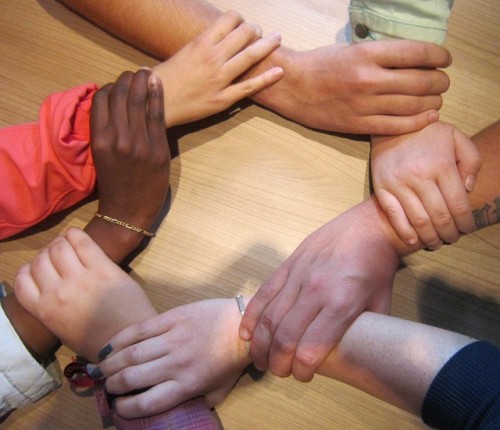TWH — Paganism, together with the polytheistic and other religions with which it is often lumped, might be characterized as standing apart from conventional cultural and legal institutions. A not-entirely-undeserved stereotype is that of fierce independence from the over-culture, if not outright contrarianism, which can be witnessed in everything from an early acceptance of same-sex marriage to a rejection of the building of infrastructure that might result in hierarchy and rules.
Even within Pagan and polytheist traditions wherein opposing cultural norms is not in vogue, it can be challenging to establish institutions and best practices for the sacred work of priest-craft and ministry simply because the faith traditions involved often don’t have enough in common for practitioners to overcome their small numbers by working together.

[Pixabay]
For the sake of simplicity, throughout this article the word “priest” refers as well to priestesses; this is not to suggest that one gender is preferred or superior over any other, but instead follows the deprecation of such words as “authoress” in acknowledgement that such roles can be filled by persons of any gender.
Kenya Coviak, a board member of the Universal Society of Ancient Ministry, is certified in mental health first aid, and has experience as a lay minister, lay counselor, and as a family service worker.
“I think it is important to differentiate between lay counseling, pastoral/priestly or clergy counseling, and professional behavioral health and psychiatric [care],” she said. “There are different requirements and scopes of involvement.”
One of the key differences — and one that varies by location — is who is deemed a mandated reporter, and exactly what must be reported. Coviak recommends checking one’s state’s web site for details, if living in the United States; the advice holds true for those living elsewhere.
Timotheos, leader of Temenos Oikidios in Rhode Island, provides his temple’s priests with training based on his own certification as a life coach.
“Life coaching has huge emphasis on boundaries,” he says. “You can’t go into psychological counseling. Spiritual coaching can fall into that same trap if you’re not careful.”
People in the Pagan communities “need to bone up on ethics,” according to Anne Hill, who teaches Boundaries and Ethics at Cherry Hill Seminary, “especially in spiritual counseling.” Not having a central church makes that all the more challenging, she adds. To that end, her students must, as one assignment, research a code of conduct, often a professional one. “Who reads the code of conduct?” she asks.
One thing that makes coaching different than counseling, Timotheos says, is its limited nature. “If the person is not moving forward or making progress within a reasonable period of time, if goals are not being reached or they are not following up, there may be something deeper going on, which is reason to consider moving them on to another person” with different qualifications.
“The word ‘priest’ means many different things,” says Anomalous Thracian, who has worked as professional clergy in the prison system. In Lukumi, for example, some of those initiated into priesthood do so to serve others, but some simply need the ashe, or medicine, which becomes available at that level.
“There’s little acknowledgement of the different contexts it’s used in,” he says.
Thracian notes that it’s important to separate out those sacred initiations from the vocational training which qualifies someone to provide counseling or other mental health support. “What kind of priest are you? Are you a ritualist, a minister, a counselor, a chaplain? Not everyone is good at everything. When people are good at one thing, they often fall into the trap of hanging a shingle that proclaims that they’re good at everything.”
“We must guard against hubris,” Hill adds.

[Pixabay]
Hill says that even basic healing work in this area would benefit from training in impairment assessment and cultural competencies. Additionally, the size of Pagan communities mean that there’s often dual relationships: one might provide counseling or coaching in one context, but be friends or coven-mates in another, and that takes practice to navigate well.
Working with people in crisis can mean working with people in serious trouble. Coviak says that to be prepared, “have an objective person look at your experience and interview you about what you can and cannot be comfortable in doing as a profession, and what you actually do as a paraprofessional. Know that if you run into a situation, it is always better to ask yourself [if] this something that will be a cause of remorse and grieving for later if you did not report it.”
She adds some questions to consider: “Are there visible marks of abuse? Is it hearsay? What is the source? Document everything you see and hear that same day before you call” any official to report a problem.
When it comes to the law, Hill also says that understanding the rules is absolutely necessary, not only when something must be reported, but whether consent forms should be used, and a clear sense of the legal exposure involved.
Mandated reporting typically protects those particularly vulnerable, especially children. When it comes to other potentially dangerous situations, such as threats of violence by one adult upon another, the law itself does not always provide such clear guidance.
According to Cat Chapin-Bishop, first chair of Cherry Hill Seminary’s pastoral counseling department, there is tort law which establishes a “duty to protect” when a counselor is made aware of a threat against another person. The precedent, established in Tarasoff v. Regents of the University of California, mandates warning the intended victim or taking other steps to protect the intended victim. That includes volunteers and unpaid pastoral counselors, she says.
“Communications with volunteer counselors are subject to some privacy protections and some mandates, and not others,” Chapin-Bishop explains.
“For instance, rape crisis services are largely staffed by trained volunteers, and the training typically entitles their clients to invoke privilege against discovery in criminal trials of the offenders. They are also typically mandated reporters of child abuse, and considered to have a duty to warn in cases of a credible threat to an identifiable victim, as in Tarasoff. The same is generally true for mental health hotline volunteers and interns. However, the truth is that there is a patchwork quilt of contradictory statutes and case law spanning the states; it’s not a simple question.”
She also recommends researching local laws carefully.
Coviak advises asking oneself, “What is the risk if I am wrong? What is the likelihood I am mistaken? Is this situation one that will run the risk of harm and danger if I don’t speak up? Is there another indicator that makes me feel that the threat is real?”
She adds, “If you are that concerned, but unsure of what to do, I suggest then to speak with to them directly if you feel it is safe. If you doubt this, then speak to mutual acquaintances and ask if they are also sharing your concerns.” A professional in the relevant field might also be able to assist in risk assessment, as well as provide needed distance from the situation.
Threats of suicide most always be taken seriously Coviak says. “Ask the question. Yes, it’s scary. Ask them anyway. Ask if they are thinking about it. Ask if they have a plan. Get someone on the phone, and ask them if they can be safe with you for right now.”
When there is a risk of harm, Timotheos says, “Client confidentiality goes right out the window. It’s on my conscience if they do it, and I could be held responsible, as well.”
At a bare minimum, referring to a mental health professional must be immediate at that point. He recommends identifying Pagan-friendly psychologists in the area. “Know who you will refer to,” he says, before it’s needed.
Thracian wholeheartedly agrees with referring to specialists as needed. “Know when you hit your limit, and refer out when you hit it,” he says, or “seek additional training” if that’s possible.

[Pixabay]
Chapin-Bishop agrees. “I would argue that the most important consequences are the purely ethical ones: acting as if one is a trained counselor puts the confidences of counselees at risk, and not observing duty to warn or mandated reporter laws can put people at serious risk of harm — not cool for those holding themselves out as competent healers and wise counselors.”
Despite having once taught the subject, Chapin-Bishop wonders about the value of Pagans providing such services at all. “I think it would be good if Pagans questioned why we believe we should offer pastoral counseling in the first place. I have a sense that we believe we should offer it, because, as a group, we desperately crave legitimacy. We want to be thought of as ‘real clergy’ practicing a ‘real religion,’ and for most of us, that winds up meaning we imitate our culture’s dominant model of both; straight out of the Christian rule book.
“As matters stand, I fear we often share the worst features of how independent fundamentalist Christian ministers operate: assuming our spiritual training gives us all the skill we could ever need, and allowing our assumptions about our relationships to our communities to make us too arrogant to analyze either our limits or alternatives to pretending to expertise we don’t actually have.”
Hill doesn’t entirely agree, saying, “We can learn from other traditions,”as to how to provide spiritually-specific care.
Clients themselves should exercise discernment, Thracian says, “shopping around” and not going to a priest that’s not qualified for the particular task. Unfortunately, he admits, not every priest is good at knowing those limits; checking references and asking around is necessary to be sure.
Chapin-Bishop nevertheless, acknowledges that there are good Pagan clergy training programs in existence, and Timotheos agrees. What he stresses, however, is that “these are skills you can’t learn from a book,” only from hands-on practice. He also notes that pastoral counseling is not what one typically learns in, for example, the priestly initiations of a coven.
Regardless of the intent of one’s clergy training, there is an assumption that priests will be capable of providing this form of support, as Thracian notes. To that end, seeking outside training as a coach, lay counselor, or mental health first aid is an important first step.
“These are not hard skills to master,” says Timotheos; they include “listening intuitively, paraphrasing, and reframing problems. Even diviners should have this kind of training, as they are in a leadership role whether or not they acknowledge it.”
Thracian adds his own ideas, including taking classes at community colleges, including ones in the philosophy of moral theory or ethics, “just to know how to discuss it.”
Additionally, he suggests engaging with “people who hold privileged information, such as attorneys and doctors, when there’s legal implications.” He also holds certifications in mediation and conflict resolution.
Once involved in this work, Thracian strongly recommends building a network of peers with which to debrief and commiserate. By speaking in an anonymized fashion about issues, clergy members can compare notes and ensure that they aren’t carrying the burdens of others on their shoulders. “Therapists do this,” he says.
Hill agrees. “Without knowing about transference and counter-transference, you won’t know why you feel bad and how to extricate yourself.” She says that Pagan practices such as grounding can help alleviate problems like compassion fatigue, which commonly plague providers. “The goal is sustainable service,” she says, rather than ministerial burnout.
Pagans, like anyone else, will at some point need support that can enter that blurry area where spirituality, mental health, and ethics converge. The key to that help being successful lies both in the priests who must clearly demarcate their own abilities and limits, and in the clients who seek succor. The need will exist whether or not the Pagan communities establish best practices, and thus relying on models from outside will likely remain an important alternative for the foreseeable future.
The Wild Hunt is not responsible for links to external content.
To join a conversation on this post:
Visit our The Wild Hunt subreddit! Point your favorite browser to https://www.reddit.com/r/The_Wild_Hunt_News/, then click “JOIN”. Make sure to click the bell, too, to be notified of new articles posted to our subreddit.

Pingback: We Are All Connected: On Atheopagan Counseling – Atheopaganism